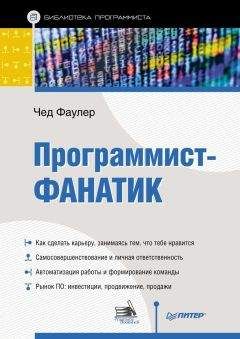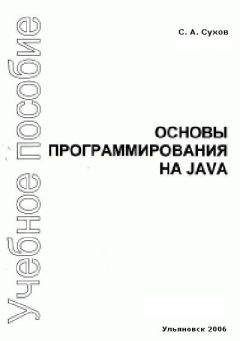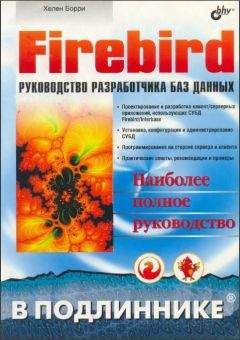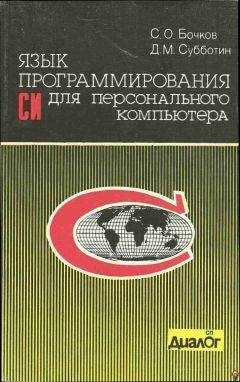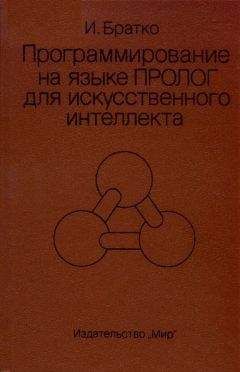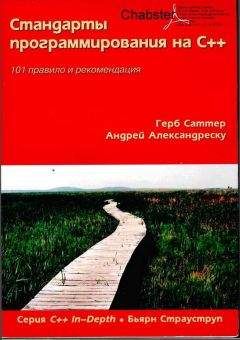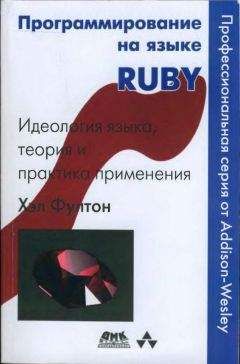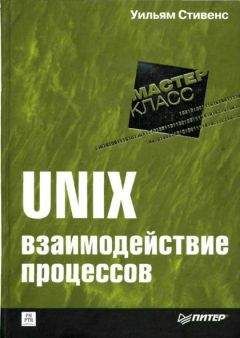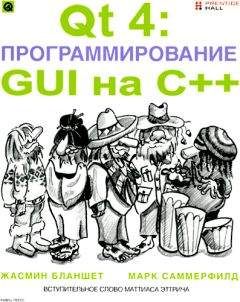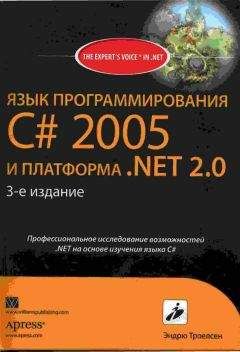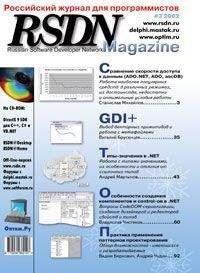Мендель Купер - Искусство программирования на языке сценариев командной оболочки
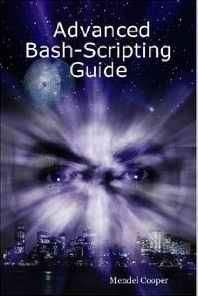
Скачивание начинается... Если скачивание не началось автоматически, пожалуйста нажмите на эту ссылку.
Жалоба
Напишите нам, и мы в срочном порядке примем меры.
Описание книги "Искусство программирования на языке сценариев командной оболочки"
Описание и краткое содержание "Искусство программирования на языке сценариев командной оболочки" читать бесплатно онлайн.
Данное руководство не предполагает наличие у читателя познаний в области программирования на языке сценариев, однако, быстро восполняет этот недостаток, постепенно, шаг за шагом раскрывая мудрость и красоту UNIX. Это руководство может рассматриваться как учебник, предназначенный для самостоятельного изучения или как справочник по программированию на shell. Руководство снабжено серией хорошо прокомментированных примеров, поскольку лучший путь к изучению языка сценариев -- это написание сценариев.
All information about hard linked files are shared, except
for the names and the name's location in the directory system.
NOTE: A "Hard link" is known as a "File Alias" on some systems.
'-' An undistingushed file
Followed by three groups of letters for: User, Group, Others
Character 1: '-' Not readable; 'r' Readable
Character 2: '-' Not writable; 'w' Writable
Character 3, User and Group: Combined execute and special
'-' Not Executable, Not Special
'x' Executable, Not Special
's' Executable, Special
'S' Not Executable, Special
Character 3, Others: Combined execute and sticky (tacky?)
'-' Not Executable, Not Tacky
'x' Executable, Not Tacky
't' Executable, Tacky
'T' Not Executable, Tacky
Followed by an access indicator
Haven't tested this one, it may be the eleventh character
or it may generate another field
' ' No alternate access
'+' Alternate access
LSfieldsDoc
ListDirectory()
{
local -a T
local -i of=0 # Default return in variable
# OLD_IFS=$IFS # Using BASH default ' \t\n'
case "$#" in
3) case "$1" in
-of) of=1 ; shift ;;
* ) return 1 ;;
esac ;;
2) : ;; # Poor man's "continue"
*) return 1 ;;
esac
# NOTE: the (ls) command is NOT quoted (")
T=( $(ls --inode --ignore-backups --almost-all --directory \
--full-time --color=none --time=status --sort=none \
--format=long $1) )
case $of in
# Assign T back to the array whose name was passed as $2
0) eval $2=\( \"\$\{T\[@\]\}\" \) ;;
# Write T into filename passed as $2
1) echo "${T[@]}" > "$2" ;;
esac
return 0
}
# # # # # Is that string a legal number? # # # # #
#
# IsNumber "Var"
# # # # # There has to be a better way, sigh...
IsNumber()
{
local -i int
if [ $# -eq 0 ]
then
return 1
else
(let int=$1) 2>/dev/null
return $? # Exit status of the let thread
fi
}
# # # # # Index Filesystem Directory Information # # # # #
#
# IndexList "Field-Array-Name" "Index-Array-Name"
# or
# IndexList -if Field-Array-Filename Index-Array-Name
# IndexList -of Field-Array-Name Index-Array-Filename
# IndexList -if -of Field-Array-Filename Index-Array-Filename
# # # # #
: << IndexListDoc
Walk an array of directory fields produced by ListDirectory
Having suppressed the line breaks in an otherwise line oriented
report, build an index to the array element which starts each line.
Each line gets two index entries, the first element of each line
(inode) and the element that holds the pathname of the file.
The first index entry pair (Line-Number==0) are informational:
Index-Array-Name[0] : Number of "Lines" indexed
Index-Array-Name[1] : "Current Line" pointer into Index-Array-Name
The following index pairs (if any) hold element indexes into
the Field-Array-Name per:
Index-Array-Name[Line-Number * 2] : The "inode" field element.
NOTE: This distance may be either +11 or +12 elements.
Index-Array-Name[(Line-Number * 2) + 1] : The "pathname" element.
NOTE: This distance may be a variable number of elements.
Next line index pair for Line-Number+1.
IndexListDoc
IndexList()
{
local -a LIST # Local of listname passed
local -a -i INDEX=( 0 0 ) # Local of index to return
local -i Lidx Lcnt
local -i if=0 of=0 # Default to variable names
case "$#" in # Simplistic option testing
0) return 1 ;;
1) return 1 ;;
2) : ;; # Poor man's continue
3) case "$1" in
-if) if=1 ;;
-of) of=1 ;;
* ) return 1 ;;
esac ; shift ;;
4) if=1 ; of=1 ; shift ; shift ;;
*) return 1
esac
# Make local copy of list
case "$if" in
0) eval LIST=\( \"\$\{$1\[@\]\}\" \) ;;
1) LIST=( $(cat $1) ) ;;
esac
# Grok (grope?) the array
Lcnt=${#LIST[@]}
Lidx=0
until (( Lidx >= Lcnt ))
do
if IsNumber ${LIST[$Lidx]}
then
local -i inode name
local ft
inode=Lidx
local m=${LIST[$Lidx+2]} # Hard Links field
ft=${LIST[$Lidx+1]:0:1} # Fast-Stat
case $ft in
b) ((Lidx+=12)) ;; # Block device
c) ((Lidx+=12)) ;; # Character device
*) ((Lidx+=11)) ;; # Anything else
esac
name=Lidx
case $ft in
-) ((Lidx+=1)) ;; # The easy one
b) ((Lidx+=1)) ;; # Block device
c) ((Lidx+=1)) ;; # Character device
d) ((Lidx+=1)) ;; # The other easy one
l) ((Lidx+=3)) ;; # At LEAST two more fields
# A little more elegance here would handle pipes,
#+ sockets, deleted files - later.
*) until IsNumber ${LIST[$Lidx]} || ((Lidx >= Lcnt))
do
((Lidx+=1))
done
;; # Not required
esac
INDEX[${#INDEX[*]}]=$inode
INDEX[${#INDEX[*]}]=$name
INDEX[0]=${INDEX[0]}+1 # One more "line" found
# echo "Line: ${INDEX[0]} Type: $ft Links: $m Inode: \
# ${LIST[$inode]} Name: ${LIST[$name]}"
else
((Lidx+=1))
fi
done
case "$of" in
0) eval $2=\( \"\$\{INDEX\[@\]\}\" \) ;;
1) echo "${INDEX[@]}" > "$2" ;;
esac
return 0 # What could go wrong?
}
# # # # # Content Identify File # # # # #
#
# DigestFile Input-Array-Name Digest-Array-Name
# or
# DigestFile -if Input-FileName Digest-Array-Name
# # # # #
# Here document used as a comment block.
: <<DigestFilesDoc
The key (no pun intended) to a Unified Content File System (UCFS)
is to distinguish the files in the system based on their content.
Distinguishing files by their name is just, so, 20th Century.
The content is distinguished by computing a checksum of that content.
This version uses the md5sum program to generate a 128 bit checksum
representative of the file's contents.
There is a chance that two files having different content might
generate the same checksum using md5sum (or any checksum). Should
that become a problem, then the use of md5sum can be replace by a
cyrptographic signature. But until then...
The md5sum program is documented as outputting three fields (and it
does), but when read it appears as two fields (array elements). This
is caused by the lack of whitespace between the second and third field.
So this function gropes the md5sum output and returns:
[0] 32 character checksum in hexidecimal (UCFS filename)
[1] Single character: ' ' text file, '*' binary file
[2] Filesystem (20th Century Style) name
Note: That name may be the character '-' indicating STDIN read.
DigestFilesDoc
DigestFile()
{
local if=0 # Default, variable name
local -a T1 T2
case "$#" in
3) case "$1" in
-if) if=1 ; shift ;;
* ) return 1 ;;
esac ;;
2) : ;; # Poor man's "continue"
*) return 1 ;;
esac
case $if in
0) eval T1=\( \"\$\{$1\[@\]\}\" \)
T2=( $(echo ${T1[@]} | md5sum -) )
;;
1) T2=( $(md5sum $1) )
;;
esac
case ${#T2[@]} in
0) return 1 ;;
1) return 1 ;;
2) case ${T2[1]:0:1} in # SanScrit-2.0.5
\*) T2[${#T2[@]}]=${T2[1]:1}
T2[1]=\*
;;
*) T2[${#T2[@]}]=${T2[1]}
T2[1]=" "
;;
esac
;;
3) : ;; # Assume it worked
*) return 1 ;;
esac
local -i len=${#T2[0]}
if [ $len -ne 32 ] ; then return 1 ; fi
eval $2=\( \"\$\{T2\[@\]\}\" \)
}
# # # # # Locate File # # # # #
#
# LocateFile [-l] FileName Location-Array-Name
# or
# LocateFile [-l] -of FileName Location-Array-FileName
# # # # #
# A file location is Filesystem-id and inode-number
# Here document used as a comment block.
: <<StatFieldsDoc
Based on stat, version 2.2
stat -t and stat -lt fields
[0] name
[1] Total size
File - number of bytes
Symbolic link - string length of pathname
[2] Number of (512 byte) blocks allocated
[3] File type and Access rights (hex)
[4] User ID of owner
[5] Group ID of owner
[6] Device number
[7] Inode number
[8] Number of hard links
[9] Device type (if inode device) Major
[10] Device type (if inode device) Minor
[11] Time of last access
May be disabled in 'mount' with noatime
atime of files changed by exec, read, pipe, utime, mknod (mmap?)
atime of directories changed by addition/deletion of files
[12] Time of last modification
mtime of files changed by write, truncate, utime, mknod
mtime of directories changed by addtition/deletion of files
[13] Time of last change
ctime reflects time of changed inode information (owner, group
permissions, link count
-*-*- Per:
Return code: 0
Size of array: 14
Contents of array
Element 0: /home/mszick
Element 1: 4096
Element 2: 8
Element 3: 41e8
Element 4: 500
Element 5: 500
Element 6: 303
Element 7: 32385
Element 8: 22
Element 9: 0
Element 10: 0
Element 11: 1051221030
Element 12: 1051214068
Element 13: 1051214068
For a link in the form of linkname -> realname
stat -t linkname returns the linkname (link) information
stat -lt linkname returns the realname information
stat -tf and stat -ltf fields
[0] name
[1] ID-0? # Maybe someday, but Linux stat structure
[2] ID-0? # does not have either LABEL nor UUID
# fields, currently information must come
# from file-system specific utilities
These will be munged into:
[1] UUID if possible
[2] Volume Label if possible
Note: 'mount -l' does return the label and could return the UUID
[3] Maximum length of filenames
[4] Filesystem type
[5] Total blocks in the filesystem
[6] Free blocks
[7] Free blocks for non-root user(s)
[8] Block size of the filesystem
[9] Total inodes
[10] Free inodes
-*-*- Per:
Return code: 0
Size of array: 11
Contents of array
Element 0: /home/mszick
Element 1: 0
Element 2: 0
Element 3: 255
Element 4: ef53
Element 5: 2581445
Element 6: 2277180
Element 7: 2146050
Element 8: 4096
Element 9: 1311552
Element 10: 1276425
StatFieldsDoc
# LocateFile [-l] FileName Location-Array-Name
# LocateFile [-l] -of FileName Location-Array-FileName
LocateFile()
{
local -a LOC LOC1 LOC2
local lk="" of=0
case "$#" in
0) return 1 ;;
1) return 1 ;;
2) : ;;
*) while (( "$#" > 2 ))
do
case "$1" in
-l) lk=-1 ;;
-of) of=1 ;;
*) return 1 ;;
esac
shift
done ;;
esac
# More Sanscrit-2.0.5
# LOC1=( $(stat -t $lk $1) )
# LOC2=( $(stat -tf $lk $1) )
# Uncomment above two lines if system has "stat" command installed.
LOC=( ${LOC1[@]:0:1} ${LOC1[@]:3:11}
${LOC2[@]:1:2} ${LOC2[@]:4:1} )
case "$of" in
0) eval $2=\( \"\$\{LOC\[@\]\}\" \) ;;
1) echo "${LOC[@]}" > "$2" ;;
esac
return 0
# Which yields (if you are lucky, and have "stat" installed)
# -*-*- Location Discriptor -*-*-
# Return code: 0
# Size of array: 15
# Contents of array
# Element 0: /home/mszick 20th Century name
Подписывайтесь на наши страницы в социальных сетях.
Будьте в курсе последних книжных новинок, комментируйте, обсуждайте. Мы ждём Вас!
Похожие книги на "Искусство программирования на языке сценариев командной оболочки"
Книги похожие на "Искусство программирования на языке сценариев командной оболочки" читать онлайн или скачать бесплатно полные версии.
Мы рекомендуем Вам зарегистрироваться либо войти на сайт под своим именем.
Отзывы о "Мендель Купер - Искусство программирования на языке сценариев командной оболочки"
Отзывы читателей о книге "Искусство программирования на языке сценариев командной оболочки", комментарии и мнения людей о произведении.






